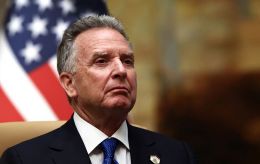Russia's economy burst at the seams amid sanctions and low oil prices
 Production of KAMAZ trucks in Russia (photo: Getty Images)
Production of KAMAZ trucks in Russia (photo: Getty Images)
Due to sanctions and falling oil prices, the Russian economy has begun a gradual transition from stagnation to recession. What this looks like and experts' forecasts are analyzed in a report by RBC-Ukraine.
Takeaways
- GDP is falling, inflation and the budget deficit are growing
- Russian officials admit economic decline
- Consumer activity in Russia is decreasing
- Oil prices will likely continue to fall, worsening the situation
The economic situation in Russia has significantly worsened since 2025. GDP growth rates are declining, inflation is increasing, and the budget deficit is rising. After stagnating for the first three years of the war, the aggressor country's economy has begun showing signs of recession. In other words, the stagnation of production and trade is gradually shifting into decline.
The clear negative trends are now recognized not only by international experts — even Russian analysts can no longer hide them.
"There is stagnation in the industry. After an increase at the end of 2024, industrial output sharply dropped in January to around mid-2023 levels and then stabilized. If we look at industrial output dynamics excluding military-industrial complex sectors, we can speak of a transition to recession," says the Russian Center for Macroeconomic Analysis and Short-Term Forecasting (CMASF) in a Q1 2025 report.
Production and hydrocarbon extraction are declining
There is a decline in the production of food, hydrocarbons, petroleum products, building materials, ferrous metallurgy, and civilian engineering. "The output of civilian goods in the first quarter decreased by 0.8% per month. As a result, production reached its lowest level since April 2023," the CMASF analysis reports.
Despite economists' assessments, the Russian government continues to express optimism and invent euphemisms to describe the situation. The slowdown in production growth is referred to as a "transition from broad-based to fragmented growth" in various sectors.
"If at the beginning and middle of last year the growth was broad-based, now fragmentation is more apparent — in some areas, growth is stronger, in others, there is decline, which is normal — not all sectors can grow by double digits annually. This kind of fragmentation in the economy, more uneven growth rates, is to be expected," sources quote Russian Deputy Minister of Economic Development Polina Kryuchkova.
GDP growth dropped nearly threefold
The numbers can't be hidden behind words. In the first quarter of 2025, Russia's GDP increased by only 1.7% year-on-year, which is significantly lower than the 5.4% growth in the same period of 2024. Russia's Ministry of Economic Development forecasts a 2.5% growth in 2025, while international experts believe it will slow to 1.6%, compared to 4.3% in 2024.
Inflation in Russia in 2025 is expected to remain quite high — at 7–8.2%, while last year it stood at 9.52%. At the end of April, Russia's Ministry of Finance revised its forecast for the federal budget deficit, worsening it more than threefold — from 0.5% of GDP to 1.7% of GDP.
The negative trends in Russia’s economy are a lasting effect of the sanctions imposed by Ukraine's partners against Russia, and the result of falling oil prices — oil sales being the main source of budget revenue.
The Russian budget for 2025 was based on an oil price of $70 per barrel, with $60 considered a critical level. Currently, Brent crude has fallen below $60 per barrel, and Russia's Urals crude is below $50. Prices are declining due to trade wars initiated by the US, as well as increased oil production by OPEC countries. Oil prices may fall further. In June, OPEC+ agreed to increase output by another 411,000 barrels per day, despite falling prices and expectations of lower demand.
Even Russian experts have pessimistic expectations
Russia may face even more serious difficulties, suggests Russian businessman Oleg Deripaska. "Oil is dropping to $45 per barrel. That means the exchange rate will rise to 115–125 rubles per dollar," he says. Currently, the dollar in Russia is trading at around 82 rubles.
Prominent Russian economist Natalia Zubarevich points to a significant decline in budget revenues. "We can see the collected revenues — those gathered in January–February, not the full quarter, mind you — they only collected 10% of the annual target. And two months, as you understand, is roughly one-sixth of the year. 10% is not enough. And in terms of spending, they’ve already used almost 20% of the annual budget," she stated.
The situation in the economy can be described in many ways, Zubarevich notes. But that doesn’t change the essence. "Let’s put it this way — it’s a matter of linguistics. Some people prefer the word 'slowdown.' That's clearly the term the government acknowledges. I prefer the term 'shift toward recession,' though there isn't a full-blown recession yet — thanks to the defense sectors and regions that are still pulling the numbers up," the expert said.
Banks hold on, major companies already in the red
Russian banks are still managing to operate with relatively good results. Last year, Sberbank achieved a record net profit of 1.58 trillion rubles ($18.1 billion). However, the bank’s return on equity dropped to 24%, down from 25.3% in 2023.
VTB increased its net profit by 15.4% year-on-year in the first quarter of 2025, reaching 141.2 billion rubles. However, annual profit may fall to 400 billion rubles due to tight monetary policy and limits on credit growth.
Meanwhile, energy companies are suffering significant losses. Gazprom reported record losses of 1.08 trillion rubles in 2024. This was caused by a drop in exports to Europe and a decline in asset value. Revenue from gas exports fell by a factor of 2.6, despite increased deliveries to China.
Rosneft's profit fell by 14.4% last year, down to 1.084 trillion rubles. This was due to rising interest rates and the depreciation of the ruble against the dollar. In January last year, the dollar was worth 89 rubles; by December, it had risen to 101 rubles. In 2025, the ruble strengthened, and by May, the dollar was worth about 80 rubles. This may be due to reduced demand for foreign currency in the domestic market as imports have declined.
Defense sector propels Russia's fragile economy
Nothing good should be expected from the Russian economy soon, according to financial analyst Andrii Shevchyshyn. "Growth is occurring in the military-industrial complex due to the war. Industrial production is up to 1.1%. If you exclude the defense sector, it’s actually negative. Investment is falling, transfers to regions have been cut – they're receiving almost nothing now. The pharmaceutical industry is growing due to import substitution amid sanctions, and the chemical industry is doing well because it is export-oriented, producing fertilizers," the expert told RBC-Ukraine.
In all other sectors, production is slowing down. "And this is not a temporary phenomenon. They've reached the ceiling of their capabilities and now can't fix the situation. The budget cushion they used to rely on is completely deflated," Shevchyshyn believes.
He also notes a decline in consumer activity. The growth rate of retail sales is more than three times lower than the growth of income. "Real incomes grew by 7.1% accounting for inflation, while retail sales grew by only 2.2%," Shevchyshyn pointed out. According to him, this may be because real income figures include deposit interest.
"Domestic trade is slowing down despite the presence of money. Lending is restricted by the Central Bank – they say people are already heavily in debt. Real interest rates on more or less long-term loans are up to 40%," the expert notes.
Looking ahead, the economic crisis in Russia has already spread far beyond the sphere of public finance, says former board member and economist of the National Bank of Ukraine Vitalii Shapran. "In many industries and regions, the situation is so critical that when people ask me for a forecast on Russia’s inflation and GDP for 2026, I respond that to make such forecasts, you have to be sure that this Russia will still exist in its current form in 2026," he said.
It's virtually impossible to find optimistic forecasts for the Russian economy today. Not only are Moscow officials silent, but even experts loyal to Putin's regime refrain from offering positive outlooks. If oil prices continue to decline or even remain at current levels, Russia will be forced to make significant budget cuts. Social programs and capital construction will be the first to go under the knife.

